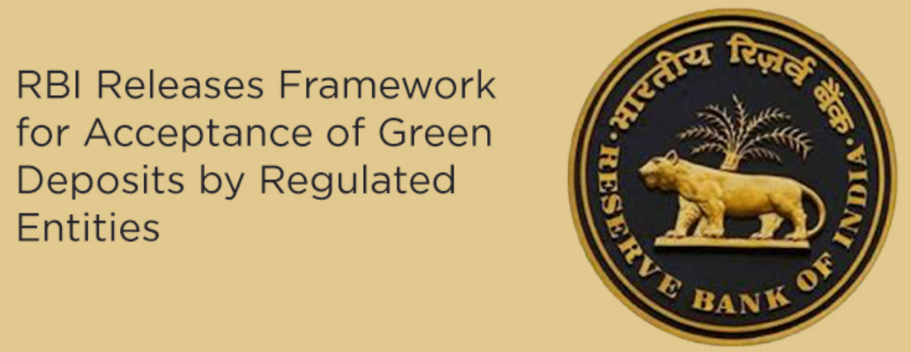
Disclaimer: Copyright infringement not intended.
Context
- Reserve Bank of India issued detailed guidelines for acceptance of ‘green deposits’ by banks and NBFCs wherein the funds could be used for financing activities like renewable energy, green transport, and green buildings.
- The guidelines will be applicable from 1st June 2023.
Green Deposit
- A green deposit refers to an interest-bearing deposit received by regulated entities (usually banks and non-banking financial institutions) for a fixed period. The proceeds are earmarked for being allocated towards green finance.
- The investment in this fixed tenure deposit will go towards financing eligible businesses and projects that promote the transition to a low-carbon, climate-resilient, and sustainable economy.
- The projects must encourage energy efficiency in resource utilization, reduce carbon emissions and greenhouse gases, promote climate resilience and/or adaptation and value, and improve natural ecosystems and biodiversity.
- Some of the common themes for green deposits are renewable energy, clean transportation, pollution prevention and control, green building, sustainable water, wastewater management, and others.
.jpeg)
Purpose of the Framework
The purpose and rationale for the framework are to
-Encourage Regulated Entities (REs) to "offer green deposits to customers,
-Protect the interest of the depositors,
-Aid customers to achieve their sustainability agenda,
-Address greenwashing concerns and
-Help augment the flow of credit to green activities/projects".

Applicability
The provisions shall be applicable to the following entities, collectively referred to as regulated entities (REs):
(a) Scheduled Commercial Banks including Small Finance Banks (excluding Regional Rural Banks, Local Area Banks and Payments Banks) and
(b) All Deposit-taking Non-Banking Financial Companies (NBFCs) registered with the RBI including Housing Finance Companies (HFCs) registered under section 29A of the National Housing Bank Act, 1987.
The Green Deposit Framework
Issuance of deposits
- The framework allows REs to issue green deposits as cumulative or non-cumulative deposits.
Withdrawal
- On maturity, the green deposits will be renewed or withdrawn at the option of the depositor.
Denomination
- The green deposits shall be denominated in Indian rupees only.
Indian Green Taxonomy to be in place
- The allocation of proceeds raised from green deposits should be based on the official Indian green taxonomy.
- Till the finalization of the taxonomy, REs would be required to allocate the proceeds raised through green deposits towards a specified list of green activities/projects.
Green Activities specified list
- Renewable energy, energy efficiency, clean transportation, climate change adaptation, sustainable water and waste management, and green buildings, are among the list of projects/activities where REs could allocate the proceeds raised through green deposits.
Projects excluded
- RBI has also mentioned about a list of 'exclusions' for REs. This includes projects involving new or existing extraction, production and distribution of fossil fuels; nuclear power generation; and direct waste incineration.
Comprehensive Board Policy
- REs are required to put in place a comprehensive Board-approved policy on green deposits, laying down all aspects in detail for the issuance and allocation of green deposits.
- The banks must present the review report before the Board of Directors within three months of the end of the financial year, covering several details on the issue.
Copy of Green Deposits
- A copy of the policy on ‘Green Deposits’ should be made available on the RE’s website.
Third-Party verification
- The allocation of funds raised through green deposits by REs during a financial year shall be subject to an independent third-party verification or assurance which shall be done on an annual basis.
Internal checks and balances
- Regarding the end-use of funds REs have the responsibility to follow laid down procedures of internal checks and balances would have to be followed as in the case of other loans.
Impact assessment
- Impact assessment to be optional for FY 23-24, and mandatory from FY 24-25.
READ ABOUT NBFCs: https://www.iasgyan.in/blogs/nbfcs-and-its-types
|
PRACTICE QUESTION
Q. Which of the following statements are correct in reference to RBI’s Green Deposit Framework?
a) The provisions of RBI’s Green Deposit Framework apply to Scheduled Commercial Banks including Small Finance Banks and Regional Rural Banks.
b) The framework allows REs to issue green deposits as cumulative or non-cumulative deposits.
c) The green deposits shall be denominated in Indian rupees only.
d) The allocation of funds raised through green deposits by REs during a financial year shall be subject to independent third-party verification on an annual basis.
1. a and c
2. b and d
3. b, c and d.
4. None of the above.
Correct Answer: Option 3
|

https://www.business-standard.com/economy/news/rbi-announces-a-framework-for-accepting-green-bonds-deposits-123041100872_1.html
https://www.taxmann.com/post/blog/rbi-releases-framework-for-acceptance-of-green-deposits-by-regulated-entities/











